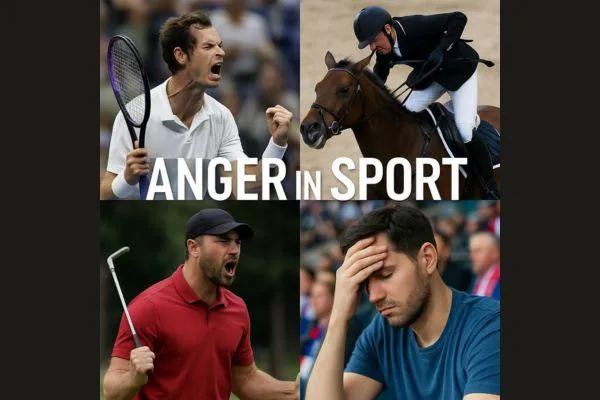Sport Hypnotherapy Blogs
Learn more about Hypnosis & Mindset Coaching and how they can be applied to your life!

When Rage Rides Alongside Talent: Exploring Anger in Sport and Its Hidden Roots
When Rage Rides Alongside Talent: Exploring Anger in Sport and Its Hidden Roots
Introduction: Incidents That Have Shocked Sports Fans Worldwide
We’ve all seen it - an athlete, under pressure, suddenly explodes. The racquet is smashed, the club is hurled, the whip strikes too many times. In that moment, something unravels. What was once a display of elite skill becomes something else entirely, something raw, unsettling, and often deeply disappointing.
For those watching from the sidelines, it can be hard to reconcile. How can someone so admired, so seemingly in control, cross a line like that? And when it involves a living being, such as in equestrian or animal-based sports, the emotional impact runs even deeper.
These moments do not just raise questions about the athlete’s actions. They also stir complex emotions in fans and fellow competitors: shame, betrayal, disillusionment. It is especially jarring when the person in question has been viewed as a role model or even a hero. And it begs a deeper question. What really causes such intense, often violent outbursts from people who can also be kind, composed, and highly disciplined?
This post explores the psychology of anger in sport: what fuels it, what it hides, and why it can erupt so suddenly. But it also speaks to those of us watching on, trying to make sense of our own reactions when someone we admire falls from grace. Whether you're an athlete, a coach, or a passionate supporter, understanding the emotional undercurrents of anger can bring clarity, and perhaps even compassion, in a world that often demands perfection and punishes vulnerability.
Anger as the Mask of Fear
At first glance, anger seems like a powerful emotion. It arrives with heat, noise, and impact. In sport, it can surge out of nowhere: a slammed racquet, a shouted curse, a whip used just a little too hard. But beneath that surface, anger often hides something far less visible: fear.
Psychologists have long understood that anger is frequently a secondary emotion, a reaction that masks more vulnerable feelings underneath. Fear of failure. Fear of judgment. Fear of not being good enough. In the highly competitive world of elite sport, these fears run deep, often buried under years of pressure, perfectionism, and identity tied to performance.
Anger becomes the body’s way of saying, "I can’t tolerate this feeling." Rather than sitting in the discomfort of fear, helplessness, shame, or emotional pain, the nervous system shifts into fight mode. It is a survival instinct, a protective layer that feels more powerful than the vulnerability underneath.
Relatable Moments of Masked Fear
Even outside elite sport, most people have experienced this pattern in daily life, perhaps without realising it. Consider these examples:
A parent snapping at their child for dawdling before school, when underneath, they’re anxious about being late to work and feeling like they’re failing to keep everything together.
A rider yelling at their horse for ‘not listening,’ when the truth is they’re afraid that others at the arena are judging them, or that they’re not good enough to manage the situation calmly.
An athlete shouting at a teammate, not because of the missed pass, but because deep down, they fear being blamed or losing the opportunity to win.
In these moments, anger offers a false sense of control. It gives the illusion of strength, but it is often a cry from the subconscious that feels emotionally cornered.
For elite athletes who are trained to push through pain, ignore emotion, and “toughen up,” fear is rarely given space to be acknowledged, let alone expressed. Over time, unprocessed fear does not disappear. It festers. And when it erupts, it can be shocking and disproportionate to the trigger.
What Needs to Change: Prevention and Accountability
Anger in sport does not occur in a vacuum. It is shaped by culture, expectation, and often, a lack of emotional literacy. For generations, athletes have been taught to toughen up, suppress emotion, and equate vulnerability with weakness. But we now know that ignoring the emotional landscape does not eliminate it. It just buries it until it breaks through.
If we want to prevent future incidents of explosive anger, especially those that harm others including animals, we need to address both prevention and accountability:
Emotional education needs to be part of performance training, not separate from it. Athletes must learn to recognise their internal triggers and develop tools for regulating intense emotion, especially under pressure.
Mindset work and trauma-informed coaching can uncover long-standing patterns that contribute to these sudden outbursts. This goes far beyond managing surface-level anger. It is about healing what drives it.
Accountability is non-negotiable. Actions have consequences, particularly when others are harmed. But accountability must be paired with support, so that behaviour is not just punished, but understood, addressed, and transformed.
In equestrian sport, there is an added layer: the ethical duty to protect a sentient partner. Riders must understand that emotional regulation is not just a personal issue. It is a welfare issue.
For athletes, coaches, and governing bodies alike, the goal is not to eliminate passion or competitiveness. It is to ensure that excellence does not come at the expense of emotional harm, to self, others, or the animals we work with.
Closing: From Shame to Shadow Work – A Path Forward
When someone we have admired behaves in a way that shocks or disappoints us, it is natural to feel shaken. Supporters and fans may feel confused, ashamed, even betrayed, especially if they have looked up to that person as a role model. These emotional ripples matter. They impact how we relate to the sport we love, and how safe we feel within its community.
But we do not have to walk away from something meaningful because of one person’s failings. Instead, we can use these moments as invitations, to reflect, to learn, and to shift the conversation. We can acknowledge our emotional responses without letting them eclipse the good. We can advocate for accountability and change, without resorting to blanket rejection or cynicism.
For those willing to look deeper, these public fallouts can lead to personal growth. Many of us have moments when anger overtakes reason, perhaps not on camera, but in our own lives. By exploring our own shadows, we build empathy for the hidden emotional battles others face too.
And in doing so, we take a step toward a new culture in sport, one where emotional integrity is seen not as a weakness, but as a vital part of performance, leadership, and humanity.

Sue Williams
Clinical Sport Hypnotherapist who specialises in working with Athletes across a broad spectrum of sports and disciplines.
Get in touch with us
Before you enquire, please have a good look through our site. We do our best to answer all questions upfront.
For new clients, be sure to watch our Getting Started Presentation which goes over the details of how our clinic runs.
For existing clients, click the Existing Client button to rebook another appointment.
For all other enquiries use the form below and we will get back to you as soon as possible.
0483 955 389
PO Box 56, Tyabb VIC 3913
Mon - Fri 10.00-4.00
Learn More
© Copyright 2025. SPORT HYPNOTHERAPY, All rights reserved.

